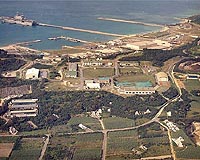| . |  |
. |
Tel Aviv, Israel (UPI) Jan 26, 2009 Israel's armed forces are adopting NATO's system of identifying and classifying equipment among its member nations, underlining Israel's buildup of ties with the Atlantic alliance. For years, Israel has kept NATO at arm's length to preserve the Jewish state's strategic independence while it confronts its Middle Eastern adversaries. The adoption of the NATO Codification System may seem a modest move, but it's an important institutional step toward strengthening links with the Western alliance, which now has 28 members. According to The Jerusalem Post, Israel actually signed an agreement adopting the NCS in 2006, but it only recently began switching its stock-numbering to the NATO Stock Number. This is a 13-digit numeric code that the alliance uses to identify everything in its inventory, from weapons systems to spare parts and computers. "This will be beneficial for us in terms of cooperation and procurement and will also help Israeli defense industries sell their products to ANTO member countries," a Logistics Corps officer explained. Israel's ties with NATO have grown considerably of late. Adm. Giampaolo Di Paola, the chairman of NATO's Military Committee, visited Israel in November -- despite U.N. allegations of war crimes committed during Israel's invasion of the Gaza Strip last winter -- to study tactics that could be of value for alliance troops fighting in Afghanistan. He discussed upgrading Israeli-NATO ties with the Israeli chief of staff, Lt. Gen. Gabi Ashkenazi, during the visit, his third to Israel in four years. The Israeli navy says that later this year it will deploy a missile warship with Operation Active Endeavor, a counter-terrorism NATO mission in the Mediterranean designed to prevent weapons smuggling. That will mark the first time Israeli forces have actively participated in a NATO operation in the Mediterranean. This is a key mission of the Israeli navy, which on Nov. 3 intercepted an Antigua-flagged freighter, the Francop, off Cyprus carrying some 350 tons of weapons reportedly from Iran and bound for Hezbollah guerrillas in Lebanon via Syria. Israel is also seeking to be allowed to participate in major NATO forums under a Strategic Concept review currently being conducted by the alliance. Israel is already a member of the Mediterranean Dialogue, set up in 1994 to promote ties with Middle Eastern states such as Israel, Jordan, Egypt and Morocco, all U.S. allies. Many in NATO argue that taking Israel into the alliance could help produce a long-elusive Middle East peace agreement. Uzi Arad, a former officer in the Mossad, Israel's foreign intelligence service, and now security adviser to Prime Minister Binyamin Netanyahu, wrote recently that "the main strategic threats facing the Euro-Atlantic community, namely international terrorism and weapons of mass destruction proliferation," come from the Middle East. "These threats, aimed at Israel as well, position Israel more than ever before on the Euro-Atlantic side. History proves that common threats can create ever-closer allies." Arad supported Israeli membership of NATO, noting: "The option of Israel's admission as a full member is also viable in the future, as long as Israel preserves independent strategic capabilities." Arad concluded that "as part of a final status peace agreement (between Israel and its Arab neighbors) Israel's place in NATO and the Euro-Atlantic community should be at the very least seriously considered, if not assured." Israel's relations with the European Union, whose membership mirrors that of NATO, have been strained for years because of the Europeans' perceived bias toward Arabs, and the Palestinians living under occupation in particular. Indeed, Israelis harbor a deep mistrust of the United Nations and other multilateral institutions they consider to be pro-Arab. But according to a recent paper on Israel's possible membership of NATO, "a new and upgraded relationship between Israel and the Euro-Atlantic community could become a critical element in helping to provide the security Israel will need in order to take steps to make peace with a Palestinian state." The paper, written by Ronald Asmus and Bruce Jackson, former Democratic and Republican heads of the U.S. Committee on NATO, noted Israel's unwillingness to surrender its strategic independence and the concern of some Europeans that a military alliance with Israel would undercut their standing with the Arab world. "If handled correctly, such a step might actually lead pro-Western moderate Arab states to also seek closer ties with the Euro-Atlantic community, something we should welcome."
Share This Article With Planet Earth
Related Links The Military Industrial Complex at SpaceWar.com Learn about the Superpowers of the 21st Century at SpaceWar.com
 Japan PM says anti-US base vote 'will of the people'
Japan PM says anti-US base vote 'will of the people'Tokyo (AFP) Jan 25, 2010 Japan's centre-left Prime Minister Yukio Hatoyama said Monday that a local election victory by an opponent of a planned US military base on Okinawa island reflects the "will of the people". The outcome of the mayoral vote Sunday makes it less likely that a controversial new Marine Corps air base will be built in a coastal area of the southern island on which tens of thousands of US troops ar ... read more |
|
| The content herein, unless otherwise known to be public domain, are Copyright 1995-2009 - SpaceDaily. AFP and UPI Wire Stories are copyright Agence France-Presse and United Press International. ESA Portal Reports are copyright European Space Agency. All NASA sourced material is public domain. Additional copyrights may apply in whole or part to other bona fide parties. Advertising does not imply endorsement,agreement or approval of any opinions, statements or information provided by SpaceDaily on any Web page published or hosted by SpaceDaily. Privacy Statement |